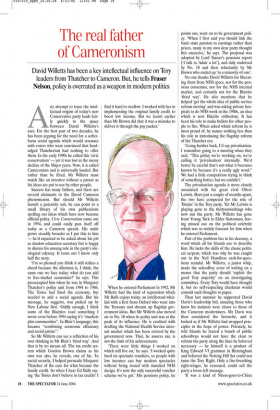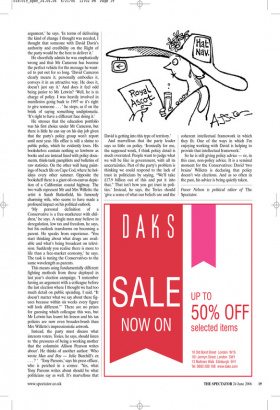The real father of Cameronism
David Willetts has been a key intellectual influence on Tory leaders from Thatcher to Cameron. But, he tells Fraser Nelson, policy is overrated as a weapon in modern politics Any attempt to trace the intellectual origins of today’s new Conservative party leads fairly quickly to the space between David Willetts’s ears. For the best part of two decades, he has been arguing for the need for a softerfocus social agenda which would resonate with voters who were convinced that hardedged Thatcherism had nothing to offer them. In the early 1990s he called this ‘civic conservatism’ — yet it was lost in the messy decline of the Major years. Now, it is called Cameronism and is universally lauded. But rather than be fêted, Mr Willetts must watch like an inventor without a patent as his ideas are put to use by other people.
Success has many fathers, and there are several claimants to the David Cameron phenomenon. But should Mr Willetts launch a paternity suit, he can point to a small library of his own publications spelling out ideas which have now become official policy. Civic Conservatism came out in 1994, and could easily pass itself off today as a Cameron speech. His smile grows steadily broader as I put this to him — he’d expected to be asked about his job as shadow education secretary but is happy to discuss his unsung role in the party’s ideological odyssey. It turns out I know only half the story.
‘I’m so pleased you think it still strikes a chord because the dilemma is, I think, the same one we face today: what do you add to free-market economics?’ he says. This preoccupied him when he was in Margaret Thatcher’s policy unit from 1984 to 1986. The Tories had fixed the economy, but needed to add a social agenda. But his message, he suggests, was picked up by New Labour first. ‘Oddly enough, I think some of the Blairites read something I wrote even before 1994 saying it’s “markets plus communities”. In Blair’s language, this became “combining economic efficiency and social justice”.’ So Mr Willetts can see a reflection of his own thinking in Mr Blair’s ‘third way’. And that is by no means all. The tax credit system which Gordon Brown claims as his own was also, he reveals, one of his. ‘In social security, I helped persuade Margaret Thatcher of the case for what became the family credit. So when I hear Ed Balls saying ‘the Tories don’t believe in tax credits’ I find it hard to swallow. I worked with her in implementing the original family credit to boost low income. But we learnt earlier than Mr Brown did that it was a mistake to deliver it through the pay packet.’ When he entered Parliament in 1992, Mr Willetts had the kind of reputation which Mr Balls enjoys today: an intellectual whizkid with a first from Oxford who went into the Treasury and dreamt up flagship government ideas. But Mr Willetts also moved on to No. 10 when its policy unit was at the peak of its influence. He is credited with drafting the National Health Service internal market which has been revived by the government now. That, he assures me, is not the limit of his achievements.
‘There were little things I worked on which still live on,’ he says. ‘I worked quite hard on spectacle vouchers, so people with low incomes can buy modern spectacles without being issued with standard NHS design. It’s now the only successful voucher scheme we’ve got.’ His pensions policy, he points out, went on to be government policy. ‘When I first said you should link the basic state pension to earnings rather than prices, many in my own dear party thought this excessive,’ he says. The proposal was adopted by Lord Turner’s pensions report (‘I talk to Adair a lot’), and duly endorsed by No. 10 and then reluctantly by Mr Brown who ended up ‘in a minority of one’.
No one thanks David Willetts for liberating them from NHS specs, nor for the pensions consensus, nor for the NHS internal market, and certainly not for the Blairite ‘third way’. He also mentions that he helped ‘get the whole idea of public service reform moving’ and was asking private hospitals to do NHS work in the 1980s, an idea which is now Blairite orthodoxy. It has been his role to make bullets for other people to fire. When asked which reform he is most proud of, he names nothing less than his role in introducing the flagship reform of the Thatcher era.
‘Going further back, I’d say privatisation. I remember going to a meeting when they said, “This policy we’re working on, we’re calling it ‘privatisation’ internally. We’d better be careful that’s not what it becomes known by because it’s a really ugly word.” We had a little competition trying to think of something better, but we couldn’t.’ The privatisation agenda is more closely associated with his great rival Oliver Letwin. Born just a couple of months apart, the two have competed for the role of ‘Brains’ in the Tory party. Yet Mr Letwin is playing guru to the thirtysomethings who now run the party. Mr Willetts has gone from Young Turk to Elder Statesman, having missed out on the political celebrity which was so widely forecast for him when he entered Parliament.
Part of the problem lies in his decency, a word which all his friends use to describe him. He lacks the skills of the classic political serpent, which was why he was caught out in the Neil Hamilton cash-for-questions scandal. Mr Willetts, a junior whip, made the schoolboy error of writing on a memo that the party should ‘exploit the good Tory majority’ on an investigating committee. Every Tory would have thought it, but no self-respecting charlatan would commit such thoughts to paper.
Then last summer he supported David Davis’s leadership bid, amazing those who knew his instincts were closer to those of the Cameron modernisers. Mr Davis was then considered the favourite, and it looked as if Mr Willetts had swapped principles in the hope of power. Privately, he told friends he feared a bunch of public schoolboys would not have the clout to reform the party along the lines he believed necessary — he himself is a product of King Edward VI grammar in Birmingham and believed the Notting Hill Set could not tame the Tory Right. Only a fire-breathing right-winger, he reasoned, could sell the party a loose-left message.
‘It was a kind of Nixon-goes-to-China argument,’ he says. ‘In terms of delivering the kind of change I thought was needed, I thought that someone with David Davis’s authority and credibility on the Right of the party would be the best to deliver it.’ He cheerfully admits he was emphatically wrong and that Mr Cameron has become the perfect vehicle for the message he wanted to put out for so long. ‘David Cameron clearly means it, personally embodies it, conveys it in an attractive way. He does it, doesn’t just say it.’ And does it feel odd being junior to Mr Letwin? ‘Well, he is in charge of policy. I was heavily involved in manifestos going back to 1997 so it’s right to give someone ... ’ he stops, as if on the brink of saying something undiplomatic. ‘It’s right to have a different face doing it.’ He stresses that the education portfolio was his first choice under Mr Cameron, but there is little he can say on his day job given that the party’s policy group won’t report until next year. His office is still a shrine to public policy, which he evidently loves. His bookshelves contain nothing so lowbrow as books and are instead lined with policy documents, think-tank pamphlets and bulletins of raw statistics. On the other wall hang paintings of beach life on Cape Cod, where he holidays every other summer. Opposite the bookshelf there is a giant oil-on-canvas depiction of a Californian coastal highway. The two walls represent Mr and Mrs Willetts: the artist is Sarah Butterfield, his famously charming wife, who seems to have made a profound impact on his political outlook.
‘My personal definition of a Conservative is a free-marketeer with children,’ he says. A single man may believe in deregulation, low tax and freedom, he says, but his outlook transforms on becoming a parent. He speaks from experience. ‘You start thinking about what drugs are available and what’s being broadcast on television. Suddenly you realise there is more to life than a free-market economy,’ he says. The task is tuning the Conservatives to the same wavelength as parents.
This means using fundamentally different fighting methods from those deployed in last year’s election campaign. ‘I remember having an argument with a colleague before the last election where I thought we had too much detail on public spending. I said, “It doesn’t matter what we say about these figures because within six weeks every figure will look different.”’ There are no prizes for guessing which colleague this was, but Mr Letwin has learnt his lesson and his tax policies are now even broader-brush than Mrs Willetts’s impressionistic artwork.
Instead, the party must discuss what interests voters. Tories, he says, should listen to ‘the pressures of being a working mother that the columnist Allison Pearson writes about’. He thinks of another author: ‘Who wrote Man and Boy — Julie Burchill’s ex ... ? ’ ‘Tony Parsons,’ says his press officer, who is perched in a corner. ‘Yes, what Tony Parsons writes about should be what politicians say as well. It’s marvellous that David is getting into this type of territory.’ And marvellous that the party leader says so little on policy. ‘Ironically for me, the supposed wonk, I think policy detail is much overrated. People want to judge what we will be like in government, with all its uncertainties. Part of the party’s problem is thinking we could respond to the lack of trust in politicians by saying, “We’ll take £17.9 billion out of this and put it into that.” That isn’t how you get trust in politics.’ Instead, he says, the Tories should ‘give a sense of what our beliefs are and the coherent intellectual framework in which they fit. One of the ways in which I’m enjoying working with David is helping to provide that intellectual framework.’ So he is still giving policy advice — or, in this case, non-policy advice. It is a seminal moment for the Conservatives: David ‘two brains’ Willetts is declaring that policy doesn’t win elections. And as so often in the past, his advice is being quietly taken.




















































 Previous page
Previous page